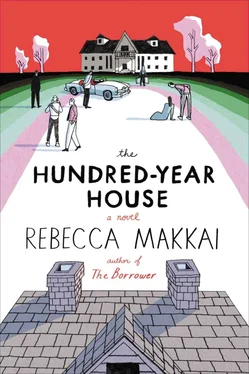Max shook his head slowly, but she saw that she didn’t need to explain it. Just as well, because now she was sobbing, a big heap on the table. “I hadn’t believed it was true, or I couldn’t believe, but then when I saw him with those files, when I saw him hurting something that wasn’t me — Max, I’ve been a perfect monster . I want to do something for her. Will you find out what she needs? To get set up comfortably somewhere?”
“You need to leave him,” he said.
“I think I might. I’m at least going back to Toronto to see my father. I’ve telephoned the travel agency to see if I might fly home. I’ll know in the morning. I might be able to go in the morning, for that matter. Just to visit.”
It was true. She wasn’t lying. It just hadn’t felt real until she’d said it.
“And then you’ll leave him.”
“I — yes. I think so.”
“But you mustn’t tell him.”
“I do think he’d figure it out eventually .”
Max chuckled — when was the last time someone had laughed at her joke? — and said, “Promise you won’t get carried away and tell him so. You’ll need lawyers first.”
She nodded, but she imagined that part would really have to wait till her father was gone. If he was truly dying, the family lawyers would be tied up with the inheritances a while.
He said, “We’ll figure it all out. We will. Grace, I don’t want you alone with him.”
“I promise.”
—
That same night, George got dressed to go out. He put on his sport coat and shaved. He’d made some friends, he said, at a bar in Highwood, and they had a business opportunity for him, a solid investment. He’d said the same thing back in July about a fellow he met down in the city. George wrote him a check for two thousand dollars and never saw him again. These new friends knew someone who would take the money to Brazil and double it. George had stayed sober for the occasion, and he danced around the bedroom as he gathered his wallet and hat. Grace lay on the bed in her yellow cotton dress, a wool cardigan on top. This was what she’d pictured, when she first settled on George: the two of them together in the bedroom before the dinner hour, George happy and energized, Grace with bare feet and a book. Only she hadn’t imagined feeling like a ball of lead.
She put her forehead to the window and watched as he trotted to the coach house. Max backed up the Darrin and climbed out, holding the driver’s door open for George himself.
Max disappeared into the garage, and George backed partway out, but then two things happened: He circled the car around to the big house door and ran inside — for his warmer hat, probably, as it was quite cold and the Darrin was a poor choice even with the roof up. And, at that same moment, down by the maple trees and all along the inside of the stone wall, the earth began to move again just as it had that day a month ago: rabbits and rabbits and rabbits. A swarm of rabbits, a plague of rabbits. Grace slid on her shoes and ran down the stairs and past George, who was rifling through the coat closet. She had to see if they were real, and if they were, she wanted to know what it was they were all doing here, surrounding the property like a hex or a blessing.
She was out the front door, and George was still inside, when Sid Cole of Indianapolis walked right through the front gate. Grace ought to have told Max to have him come in the side gate at least, but here he was, hands in his pockets, shoulders hunched against the cold, heading straight down the drive toward the big house. The grass was wet and cold, and he probably wanted to stay off it until he reached the path to the Longhouse, but it made it look, Grace realized with horror, as if he were here to see her in George’s absence. Her young date for the evening. She didn’t have time to warn him without yelling out, and George was coming out the door behind her just now. So what she did instead was to turn and catch George by the waist and turn him toward her and the coach house at once — away from Sid, who seemed oblivious in his stride. She said, “Take me with you tonight. Let me come with you.” She pulled him hard against her.
He put his hand on her posterior and said, “I’m meeting these fellows.”
“I’ll charm them.”
He stepped back and looked her up and down, judging her presentability. It was true that for once she wasn’t hiding a bruise. The bandage was off her forehead and the stitches were out, just a clean pink mark now.
She said, “It’ll be fun.”
“All right, Duck.”
He opened the passenger door with an exaggerated bow, and as she stepped in she managed to catch Sid’s attention. He was only ten yards away, but when he saw the warning on her face he darted back among the maple trees before George came around the car. He wasn’t well hidden, but it didn’t matter.
They shot down the drive, pebbles flying up and hitting the bottom of the frame like a mortar attack. Sid was a blur out Grace’s window, his face calm and curious. He couldn’t have understood that Grace had just saved his life as well as her own.
—
They took the back corner table at Pasquali’s, and George nodded in passing to two swarthy men at the bar. “They’ll join us when their partner’s here,” he said. Grace realized she’d have to sit quietly through whatever ridiculous scam they wanted his money for — she’d watch mutely as he wrote a check from their joint account — or else the night could go unpleasantly wrong.
There was a record on: Frank Sinatra sang “Ain’tcha Ever Comin’ Back?” Everything smelled good, and Grace was ravenous. Amy would be getting dinner ready at home and wondering where Grace had gone.
Grace steeled herself to smile at George, but he wasn’t paying a bit of attention. He looked at the two men, and the door, and the bartender, and the menu, and the next table. He ordered a scotch, plus a bottle of Chianti for Grace’s benefit. The wine went right to her head, though, in a way it usually didn’t. It had been a while — since Paris, really — that she’d had any regular amount of wine. But one glass in, she felt dopey and dizzy, and her mouth felt full of cotton.
She ordered lasagna.
“You’re getting stout,” George said, when the waiter had walked away.
“It’s Amy’s cooking,” she said, though she wanted to argue, to tell him it wasn’t true at all, it was only her bust that was suddenly a bit larger. And then, wall of ice: It was November 16. She’d bled in September, back when it was warm enough to walk to the pharmacy in her blue cotton dress. And that must have been the last time. She was an idiot. A dizzy idiot, with blackness closing around her head. She’d been so distracted. Right when the witch showed up, right when George pinned Amy to the tree — that should have been the next time. She’d spent the next month watching everyone and everything but herself, and meanwhile she grew slow and slept late, and the smell of Amy’s coffee made her gag, and she began crying at the drop of a hat.
The waiter set her plate in front of her. A heap of lasagna, clots of red leaking out the frilled edges. George was talking about Quebec, about taking a motor trip in the spring.
She wanted to think to herself that she’d never go on that trip because she’d be a free woman by then, but she knew it would be the opposite. She’d be at home with a watermelon stomach or a squalling baby, and maybe he’d be there too, or maybe he’d be off without her, but she’d never get free of him now.
The room blurred, and fell to little stars, and came back together in flashing colors and shapes. The shapes locked back to reality with a sickening little click. Just like the bricks of the house — everything cemented together, everything in order. Her entire life was like those bricks, she saw it now. And every attempt at escape just locked her further in. She’d tried to marry someone wild, and ended up in a prison. She’d tried to leave him, and ended up tethered to his child, growing inside her.
Читать дальше












